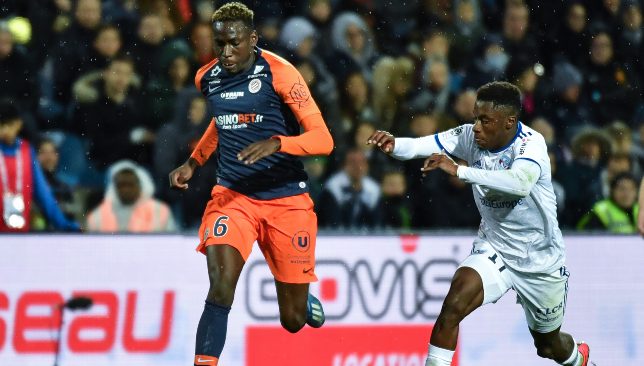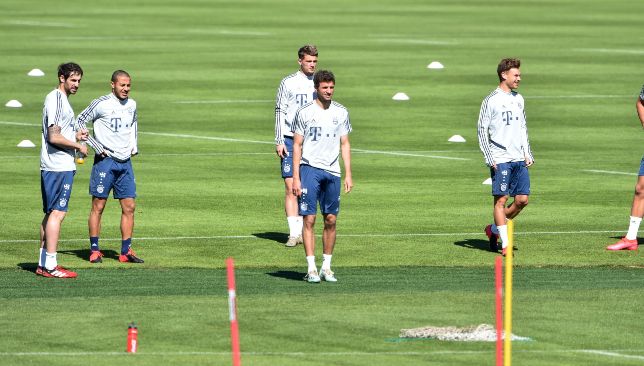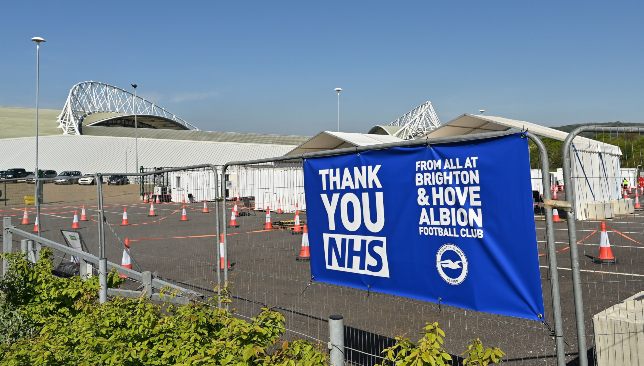
Junior Sambia is a name known to few outside Ligue 1.
Montpellier’s unheralded 23-year-old defensive midfielder is now, however, the most-important figure in European football as a multitude of competitions plot tentative returns to action amid a first wave of the coronavirus pandemic that appears to have peaked in many places, yet ebbed away in so few.
The French top flight’s first confirmed sufferer of the disease was hospitalised last week, placed into an artificial coma and given breathing support. Agent Frederic Guerra, thankfully, told Radio Tele Luxembourg on Saturday that his client “is no longer in a coma” and “is starting to breathe by himself, so that is already a good thing”.
Prime Minister Edouard Philippe, however, then instructed Ligue 1 and Ligue 2 outfits by this Tuesday that no sporting events will take place until at least September. A seismic announcement that meant “the 2019/20 season, notably for football, will not be able to resume.”
Cause and effect is undeniable.
Sambia’s perilous situation has presented a chastening, yet markedly unreported, development when placed into context of the Bundesliga’s proposed May 9 return, Serie A commencing individual training on May 4 and the Premier League’s ‘Project Restart’ pencilling in a June 9 kick-off.
The complexities of his situation and severity of symptoms – for someone who would usually stand as the epitome of physical health – exemplify the Gordian knot of medical, moral, legal and economic issues faced by authorities.
There is no guarantee they can be successfully untied, anytime soon, within countries that continue to count their daily death toll in the hundreds and fresh cases in the thousands.
Sambia’s team-mate Andy Delort eloquently described the cognitive dissonance performed by a sport slow to accept its futility in the face of such an infectious affliction.
“We have a group of players on WhatsApp and when we heard the news, it really shocked us,” he told RMC Sport on Tuesday’s broadcast. “I even think it put a blow to French football.
“We thought that athletes could be spared and there it is a 23-year-old player who is seriously affected. I think it was the drop that makes the vase tip over and that today the championships stop.
“Junior is much better today than he was three or four days ago. I would also like to have a thought for Guy Elfassy, a long-time volunteer at the club, who left us yesterday.”
A typical career had played out for Sambia before the consequential events of this month. He’d rebounded from release by giants Lyon in his mid-teens, as plenty do, impressively flowering in the lower leagues until joining the 2011/12 Ligue 1 champions in July 2018 for €2 million.
The gangly anchorman’s subsequent tally of one goal in 44 top-flight appearances for mid-table Montpellier ensured he didn’t generate the column inches and fevered scouting reports of the chosen few in European football’s great hotbed of prodigious talents.
Neither is a positive coronavirus test an exclusive preserve. Arsenal manager Mikel Arteta and Chelsea winger Callum Hudson-Odoi are high-profile examples from the Premier League; Serie A cases sit in double digits, with Juventus superstar Paulo Dybala reportedly testing positive for the fourth time in six weeks as he struggles to shake off the condition; and Paderborn defender Luca Kilian was the first Bundesliga player to contract the disease.

Strict protocols are in place at Bayern Munich’s training.
Sambia, though, stands apart because of the ravages inflicted on him, beginning with three days of severe diarrhoea.
“His condition is improving day by day,” Montpellier president Laurent Nicollin also confided to RMC Sport. “We kiss him, all the players support him.
“It hurt the group last week. When it happened, everyone asked themselves the question of recovery.
“The Prime Minister removed all these doubts for my workforce, which was worried about the situation.”
Sambia, publicly at least, has been uniquely addled across the major leagues.
There will, though, always be outliers. Why should the big tournaments be held back when other sections of society, also judged not at risk, are returning to work?
This was La Liga president Javier Tebas’ bemused reaction to Ligue 1’s choice.
He said: “I do not understand why there would be more danger in playing football behind closed doors, with all precautionary measures, than working on an assembly line or being on a fishing boat on the high seas.”
This stance is further verified by United States’ Centers for Disease Control and Prevention figures in March that showed the 20-44 age range accounted for 14.3 per cent of hospitalisations, two per cent of emergency care cases and has a 0.1 per cent fatality rate. Many of these had one or more underlying conditions.
A posteriori knowledge also evidences that Chelsea’s Angus Douglas was one of just a handful of footballers who passed away a century ago when the Spanish Flu, far more lethal than coronavirus, killed between 50m-100m globally.
Yet it would be callous to treat Sambia’s symptoms as a one-off.
Organising bodies and governments must navigate an ethical maze when they allow football to recommence.
Taiwan and South Korea, for example, only granted permission when they were recording fresh daily cases in the low double digits – or less.

Brighton & Hove Albion’s ground has been opened up for the NHS.
The Premier League plans to spend £4m on conducting 26,000 coronavirus tests, according to the Daily Mail. Yet the optics are troubling for this undertaking when healthcare workers in the United Kingdom have struggled to be examined.
There is also the alarming fact that Sambia “tested negative and then positive”, according to his agent. This is not a bulletproof approach.
If he can be impacted, furthermore, in such extreme fashion, what happens when players are making repeat physical contacts, plus potentially spitting near each other and sweating?
Then there is the possibility of footballers, whether symptomatic or asymptomatic, infecting their families once social distancing ends.
Manchester United and England great Wayne Rooney enunciated strident views on the topic.
“I know how I feel: if any of my family get infected through me because I’ve had to play when it’s not safe, and they get seriously ill, I’d have to think hard about ever playing again,” the current Derby County forward wrote in the Sunday Times.
“I would never forgive the authorities. That’s one player from thousands of players but I bet plenty of us feel the same.”
Premier League sides have been briefed on a six-week lockdown within hotels to get the season finished. An extreme measure, but one that is understandable when the Daily Mail estimates combined losses of more than £1 billion across the 20 sides if 2019/20 is voided.
Meticulous measures proposed by the Bundesliga – according to Der Spiegel – include wearing face masks during matches. DW stated a premature end to the season could cost clubs in Germany’s top-two divisions €750m.
The chair of FIFA’s medical committee, Michel d’Hooghe, though, has warned against restarting 2019/20.
“My proposal is if it is possible, avoid playing competitive football in the coming weeks,” he told BBC Sport.
“Try to be prepared for the start of good competition next season.”
He added: “There is a risk and it is not a risk that has small consequences.
“It can have consequences of life and death and that is why I am so careful and I ask everyone to be very careful before deciding to play again.
“I speak as a medical doctor, I don’t have to speak as an organiser of matches, but for the moment from my medical standpoint I would be very sceptical.”
Coronavirus can, clearly, be mitigated among footballers and their kin. An efficacious methodology would prevent financial oblivion for many professional clubs.
These plans are what UEFA have demanded to hear by May 25 if divisions are to complete 2019/20 on the pitch.
But Sambia, cruelly, shows that European leagues cannot hope to completely eliminate the sizeable danger in the short to medium term.
An unenviable choice, then, awaits.
🥰🧡💙 pic.twitter.com/sRcrIZT4FL
— MHSC (@MontpellierHSC) April 20, 2020